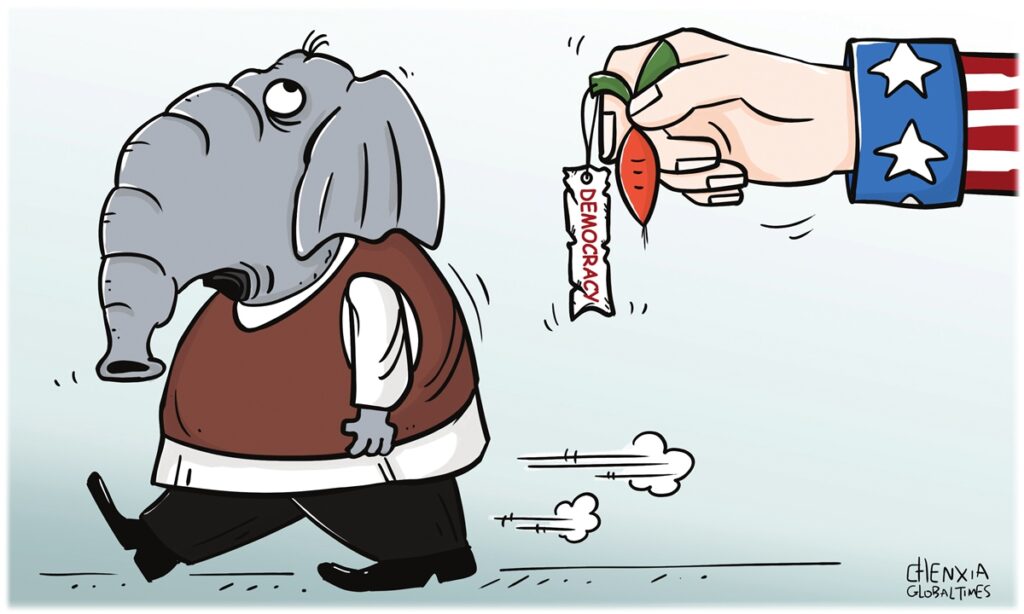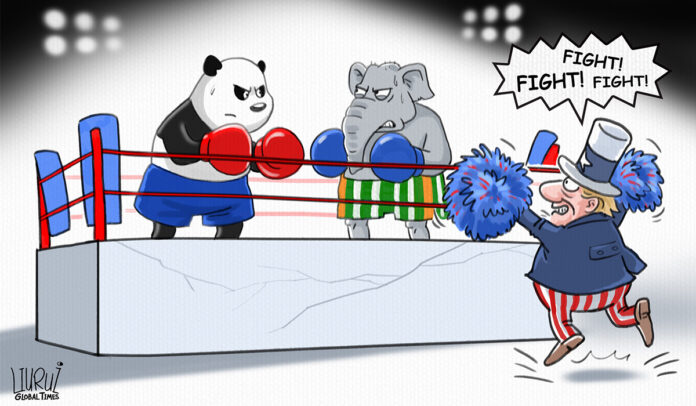There is a saying that better trust an intelligent enemy than a foolish friend. Nothing seems to have come more true than of Modi-Trump bonhomie that fell flat facedown as 50% US tariffs kick in today.
The tariff threat has not exactly scared India into kowtowing to Trump’s demand, but it has certainly warmed the cockles of China’s heart which has been telling India since ages that do not trust America. Renowned American policy hawk and top diplomat Henry Kissinger had once said “It may be dangerous to be America’s enemy, but to be America’s friend is fatal.”
India’s hyper-nationalistic and super-excitable media has been almost calling names, sometimes bordering on stern warning to China viz. “Cheen, Sudhar Ja!” (China, behave!) but in contrast the Chinese media, especially official media such as Global Times, Xinhua or China Daily, maintained a calm and unperturbed tone advising India from time to time against getting too close and trust America. A look at some gleanings of Chinese wisdom, piece of good neighbourly advice from the Dragon’s official media in the recent past:
A cautionary op-ed in the Global Times “As India embraces US, it should be cautious of America’s habit of backstabbing friends” argues that the U.S.-India warming is transactional and warns India not to over-rely on Washington. “Because America has a long record of turning on former allies when interests shift, India should not assume that present warmth guarantees long-term, unconditional support from Washington.”

The editorial “Flatteries from US and West are belittling India” calls on India to push back the American and Western praise of India as they were cunningly patronizing and strategically motivated.
“The Western compliments often mask strategic exploitation and that Washington’s praise can be condescending rather than genuinely supportive of India’s independent rise.”
Another analysis observes that there are “Different interests prevent New Delhi from closer defence ties with Washington.” Divergent threat perception and a desire of India for multipolarity are reasons why India resists full military entanglement with the US.
” Because India’s strategic priorities and threat assessments differ from those of Washington, New Delhi remains cautious and only selectively deepens defence ties rather than entering a full security alignment,” it points out.
In a stark edit “Alliance with US will crush India’s great power fantasies” China’s official mouthpiece Global Times warns that “entering into a binding alliance with the US risks reducing India’s autonomy and could prevent New Delhi from pursuing an independent path to major-power status.”
On another note, the editorial “India values ‘strategic independence’ over relying on US despite series of meetings with Quad members” praises India’s balancing act – working with Quad and US but insisting on strategic autonomy. ”Even while India increases engagements with Quad partners, New Delhi consciously preserves autonomy and will cooperate only when it serves its own national interests,” it notes.
“Can India tell US’ true intention when Washington is courting it?” questions a skeptical op-ed as it urges India to inspect U.S. motives before placing a deep trust. The author asks New Delhi to “look beyond flattering rhetoric and assess whether U.S. overtures are driven by genuine partnership or by Washington’s desire to enlist India against China.”

A pre-tariff editorial “US unrealistic about turning India into a pawn” taunts America and says the US hopes of reducing India to a simple instrument against China misunderstand India’s policy of maintaining a “strategic autonomy.”
The article notes that Washington treats India as a convenient “piece to be moved against China, but New Delhi is not likely to accept being cast merely as a US pawn.”
Chinese Media After Tariffs Hit India
“US-India trade tension further escalates, as Washington raises tariffs” commentary reminds “how quickly economic ties can turn punitive when political priorities change.”
“India, Brazil continue to resist against US tariffs” hails India’s tough stance on tariffs. “Modi’s public stance that India will not surrender domestic priorities to the U.S. tariff pressure, signals New Delhi’s willingness to endure economic pain rather than yield strategic independence.”
The editorial “India needs a more balanced foreign policy” calls upon India to recalibrate relations after punitive U.S. tariff measures. New Delhi should “broaden its partnerships and avoid over-reliance on the US after Washington’s tariff hikes risked shutting Indian goods out of a major market.”



